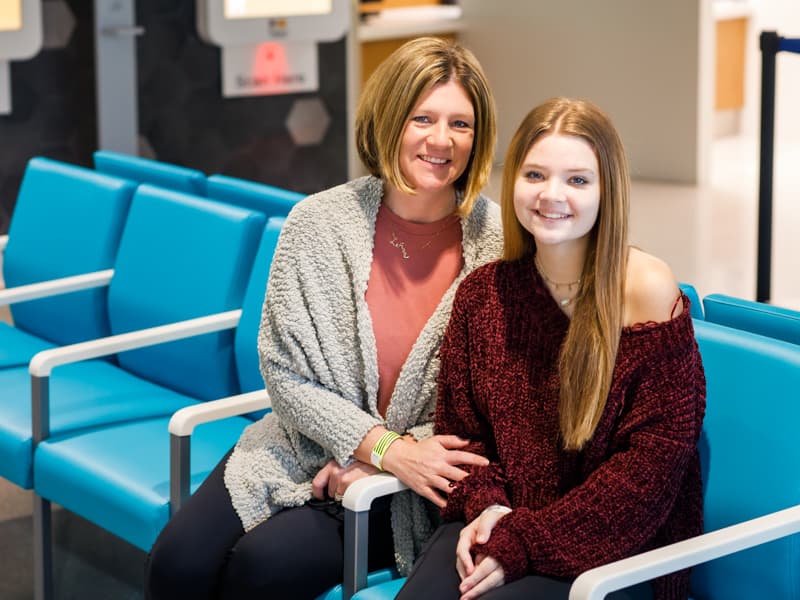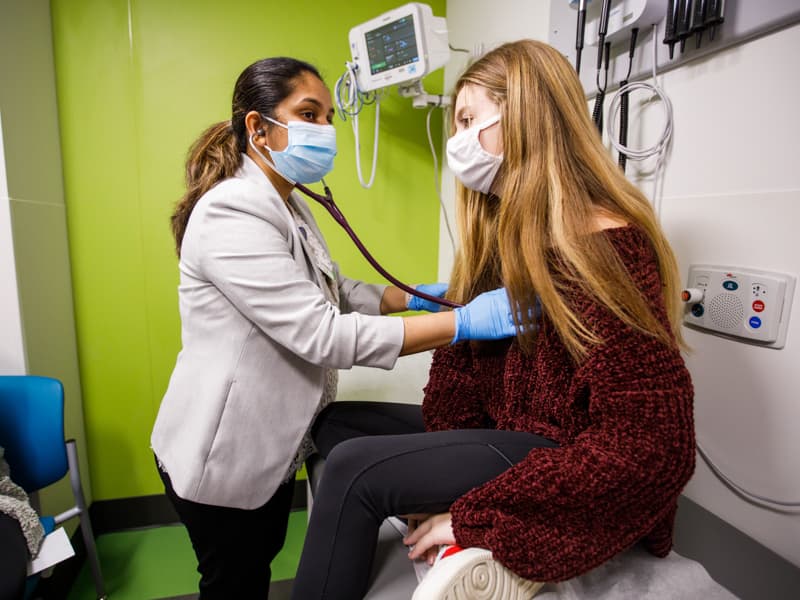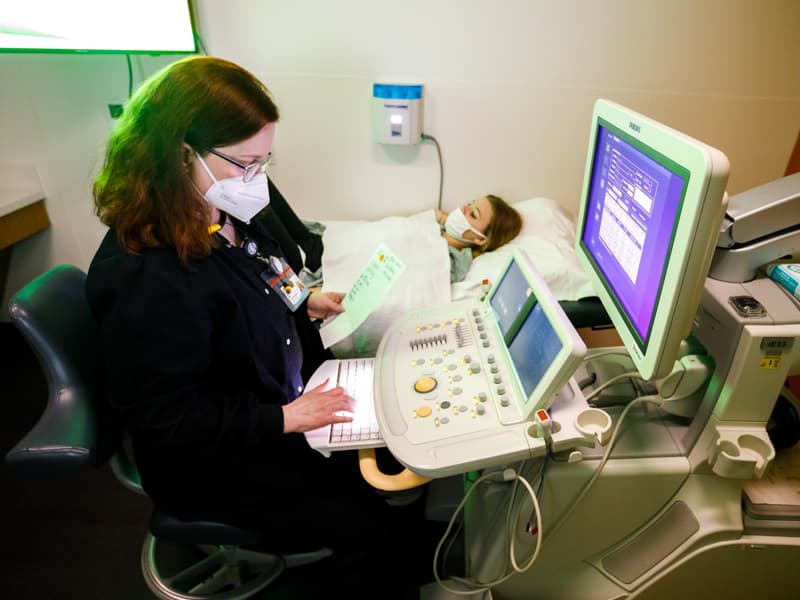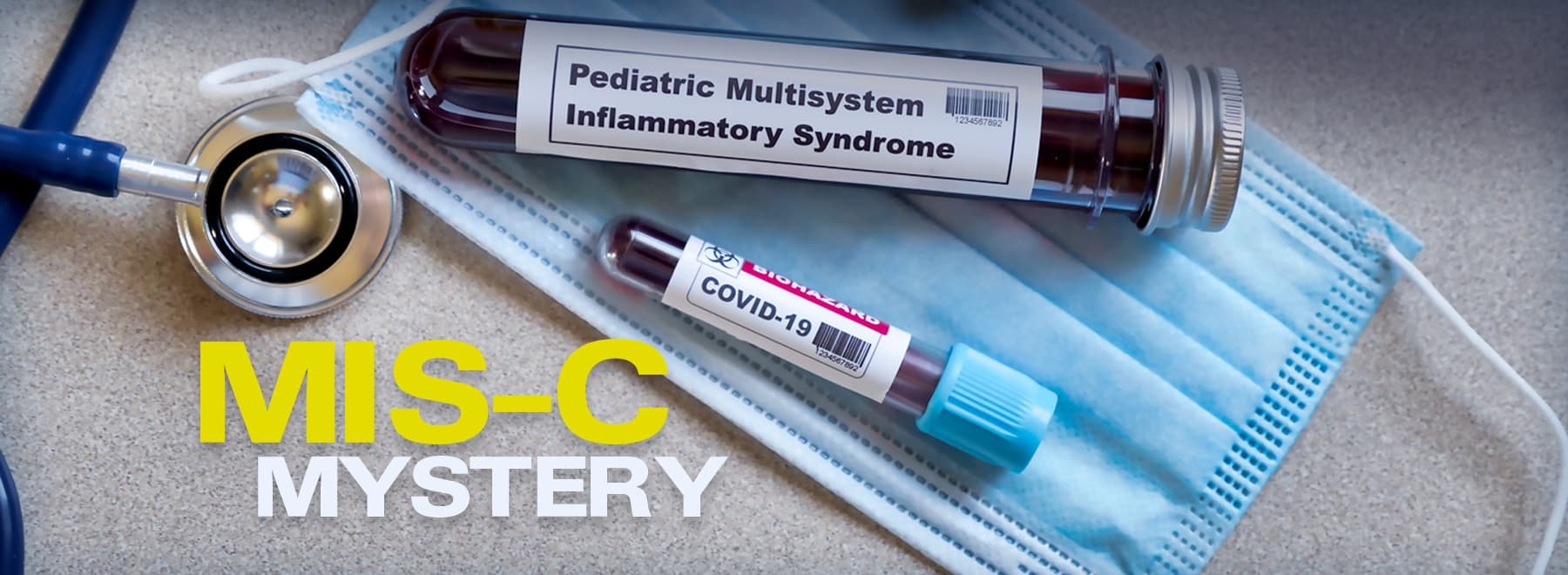Care, research help pediatricians solve multisystem enigma
On a Monday, 13-year-old Allie Henderson called her mother from school to tell her “she wasn’t feeling like herself.”
By Saturday, the Copiah Academy eighth-grade student was in the Children’s of Mississippi Pediatric Intensive Care Unit, diagnosed with MIS-C after an asymptomatic case of COVID-19.

LeAnn Henderson and her daughter, Allie, visit the Children's Heart Center in the Kathy and Joe Sanderson Tower at Children's of Mississippi.
“I’m still stunned by how sick my child was,” said Leann Henderson, Allie’s mother.
MIS-C, or Multisystem Inflammatory Syndrome in Children, is a rare but serious condition that is thought to be a delayed reaction to COVID-19. In MIS-C, the immune system of a child who has been infected with COVID-19 attacks the body’s healthy cells, particularly those involving blood vessels, the heart and other organs.
MIS-C mystery
Allie felt well enough that Monday to play in a basketball game after school, but by Tuesday, “she was burning up,” Henderson said.
Her fever wouldn’t break. By the following Thursday, Allie had a negative rapid test for COVID-19 and a negative strep test at a local clinic. By this time, severe stomach pain accompanied a high fever. A CT scan at a Mississippi hospital showed an inflamed appendix, so an appendectomy was performed there that day.

Dr. Jyothsna Akam-Venkata, a cardiologist, listens to Allie's heartbeat during an outpatient visit to the Children's Heart Center at Children's of Mississippi.
Her fever came back the next day.
“Her body was exhausted,” Henderson said. “Her eyes were bloodshot and her blood pressure was dropping. Her hands were splotchy. Now we know those were symptoms of MIS-C, but we didn’t know that then.”
On that Saturday, five days after she first felt symptoms, Allie was transferred to Children’s of Mississippi, the state’s only pediatric hospital.
“We weren’t there 30 minutes when doctors were saying they suspected she had MIS-C,” Henderson said. Allie immediately received a COVID-19 PCR test and additional testing, including an EKG, an echocardiogram and imaging.
“After that, it was a waiting game to see what her diagnosis was,” Henderson said. The testing showed Allie had had an asymptomatic COVID-19 infection about eight weeks prior.
MIS-C shows up in pediatric patients weeks to months after their COVID-19 infection. The MIS-C was affecting Allie’s heart, lungs, appendix and gastrointestinal system. During her illness, Allie lost 15 pounds.
“She was very, very sick,” Henderson said, “but they told us they could treat her and that she was going to be OK, so that’s what we were holding onto.”
Warning signs

MIS-C is a serious condition for children, but it is very treatable, said Dr. Charlotte Hobbs, professor of pediatric infectious diseases and director of UMMC’s MIS-C clinic.
Similar to Kawasaki Disease, MIS-C is an inflammatory condition. While it occurs in children who have first had a COVID-19 infection, MIS-C is not contagious.
An early symptom is fever for more than a day; other symptoms may include vomiting, diarrhea, neck pain, rash, bloodshot eyes and fatigue. Parents seeing these warning signs in their children should seek care immediately to prevent MIS-C from becoming a life-threatening condition.
Treatments that have been successful include intravenous immunoglobulin and steroids, according to protocols from the American Academy of Pediatrics. These were all treatments that helped Allie recover.

“She was very ill when she came to Children’s of Mississippi, having the appearance of septic shock,” said Dr. Claire Nettles Gilliam, assistant professor of pediatric hospital medicine and general pediatrics, who provided post-intensive care for Allie. “She, like many of our MIS-C patients, was placed on antibiotics pending bacterial cultures. However, based on other labs and the severity of illness, she was also rapidly treated for MIS-C with multiple consultants involved.”
About a month after her MIS-C diagnosis, Allie is still feeling the effects of MIS-C. She tires more easily and has trouble concentrating at times, Henderson said. As she recovers, Allie is receiving care in pediatric cardiology, rheumatology and hematology.
Gilliam said while MIS-C is rare, parents should be aware of the condition.
“We did see an increase in cases in mid-late January, which I suspect was due to increase in COVID cases through the holidays,” Gilliam said. “MIS-C is likely to be proportional to COVID case numbers from prior weeks. Even if a child never had a diagnosis of COVID, if he or she has a fever for multiple days along with other symptoms, like severe abdominal pain, vomiting or diarrhea, rash, lethargy or swelling in hands or feet, they should be evaluated by a physician.
“At this point, we don't know if there are long-term effects of MIS-C, so the earlier it is treated, the better.”
Studies underway
UMMC experts in pediatric infectious diseases have multiple research studies underway to shed light on COVID-19 and related conditions. From treatment protocols to offering free educational webinars for the state’s pediatricians on COVID-19 and children, the Medical Center’s pediatric specialists and subspecialists have been working to improve care and increase understanding of the novel coronavirus and its effects in children.
“Because adults more commonly have experienced severe infection with COVID-19 than children, there’s not as much focus on COVID-19 and pediatrics,” Hobbs said.

Paula Prem, Children's of Mississippi sonographer, looks at Allie Henderson's information.
To update pediatric health care providers across the state, a free monthly webinar on COVID-19 and children is available, along with professional education credits. The webinar, supported by the UMMC Center for Telehealth, is available from 4:30 to 5:30 p.m. on the second Thursday of each month.
“Each month, a subspecialist who cares for children with COVID-19 or its complications leads a 30-minute discussion,” Hobbs said. She leads the second half of the session, “Hot Topics and Q and A" for pediatric COVID-19 and its complications, reviewing important articles, CDC and MSDH guidelines, and diagnosis, management and treatment updates.
Though MIS-C is rare, “we’re seeing cases now because MIS-C lags behind COVID-19 peaks by at least two to four weeks,” Hobbs said. “It’s important for parents and pediatricians to know the symptoms of MIS-C, because if it is not treated very aggressively early, MIS-C can become more serious or even deadly.”
UMMC’s Division of Infectious Diseases and Department of Pediatrics contributed to the study, “Characteristics and Outcomes of U.S. Children and Adolescents with Multisystem Inflammatory Syndrome in Children (MIS-C) Compared with Severe Acute COVID-19,” published by the Journal of the American Medical Association.
The study found that patients with MIS-C are more likely to be 6 to 12 years old and non-Hispanic Black. Patients who developed MIS-C tended to have more severe cardiovascular involvement and more extreme inflammation during their COVID-19 infection than children who had COVID-19 but were not diagnosed with MIS-C.
The above article appears in CONSULT, UMMC’s monthly e-newsletter sharing news about cutting-edge clinical and health science education advances and innovative biomedical research at the Medical Center and giving you tips and suggestions on how you and the people you love can live a healthier life. Click here and enter your email address to receive CONSULT free of charge. You may cancel at any time.



